
 |
 |
|
| About Us |
|
Read Past Issues | Resources | Composer Links |
|
|
NAXOS AT 15: STILL ONE OF A KIND
A rumpled bearish man with an impressive shock of white hair, Heymann is a somewhat aloof figure who admits he’d rather be the subject of a Harvard Business Review case study than be given an honor for having made a treasury of great music accessible to millions of people at an affordable price. When he launched Naxos in Hong Kong 15 years ago, Heymann figured he had a window of maybe 50 CD releases before the large record companies caught on and started issuing high-quality, budget-priced CDs of their own which would drive him out of business. He over-estimated his rivals big time. "When I started the Naxos label my ambition was to make classical recordings available on CD at a price comparable to that of LPs,” he says. “Not in my wildest dreams did I expect my humble creation to become the world's leading classical label in just 15 years. Now, I am amazed to see how Naxos has revolutionized the record business to become the best-selling classical label in the world" The Naxos catalogue now comprises more than 2400 releases - the largest catalogue of available unduplicated repertoire anywhere, offering music lovers a veritable encyclopedia of classical music. Today Naxos dominates classical music sales in the UK, Germany, and Scandinavia with 30%-80% of the per unit classical market. Last year Naxos sold over 10 million CDs. The Heymann formula is simple to define—virtually impossible to emulate. Naxos produces first-rate CDs using little-known orchestras and performers. No temperamental sopranos, no podium-smashing conductors. Production is excellent but strictly budgeted. Staff levels are low are deliberately kept that way. Cover art? Brochures? What’sare they? Heymann never records the same piece twice—why compete with yourself in the marketplace? What makes the Naxos story most remarkable is not simply that a smart and penny-pinching German businessman was able to develop and grow a huge global market for budget classical recordings but that he has done so while maintaining an extraordinarily high level of quality. Naxos recordings have over 350 top 3-star recommendations in the Penguin Guide and have been awarded more than 35 Gramophone Editor's Choices. In 1999, Naxos won its first Gramophone Award. In many cases, the Naxos version is not only the best version available, it’s also the only version available—particularly in chamber music where no other record company has as extensive a repertoire. Insiders say that Naxos high artistic quality is a direct result of close attention paid to each release by Heymann and his wife, the Japanese violinist Takako Nishizaki. Heymann is likely to shrug. “Maybe the other Independents know music but they don’t handle the business so well. We do a good job on both.” Whatever Naxos
is doing right, let's hope it continues with great success for a long time.
--JB
|
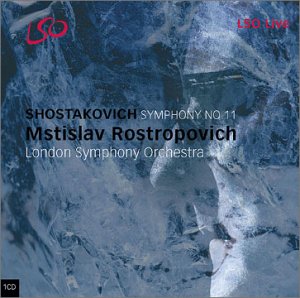
Symphony 11: The Year 1905 Composer: Dmitri Shostakovich Performers: Mstislav Rostropovich, London Symphony Orchestra Lso Live - #30 How many ways can you spell superb? From the tortured beginning to the shattering climax, Rostroprovich maintains a sense of rising foreboding and menace that inspires a cold sweat in the careful listener. This is one of those live performances that concertgoers tell their friends about years later. Symphony 11 is rarely mentioned in the list of Shostakovich's greatest orchestal works. This recording may change that. The LSO has never sounded better or more Russian. Surefire Gramophone winner. |
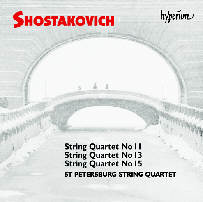
String Quartets 11 13 & 15 Composer: Dmitri Shostakovich Performers: St. Petersburg String Quartet Hyperion - #67157 More spectacular music from Russia's tormented genius, superbly played. The 11th Quartet breaks from the more traditional four-movement structure, and comprises seven separate short movements thematically unified by a sequence of phrases introduced at the beginning of the first movement. The 13th is the only single-movement quartet in Shostakovich's output. The 15th Quartet was written in 1974, the year before Shostakovich's death and seems to reflect his state of health and mind. Stark and brooding, it sounds most like a last will and testament. |
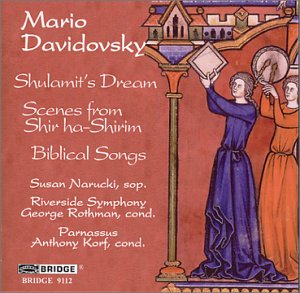
Shulamit's Dream; Scenes from Shir ha-Shirim: Biblical Songs Composer: Mario Davidovsky Conductor: George Rothman, Anthony Korf Performer: Susan Narucki, Mark Bleeke, et al. Bridge - #9112 Commissioned by the San Francisco Symphony in 1993 and given its New York premiere by Susan Narucki and the Riverside Symphony at Tully Hall in 2000, Shulamit's Dream is a suprisingly lyrical, “quasi-rhapsodic” setting of The Song of Songs by the Argentine-born Davidovsky, who came to the U.S. about 45 years ago and became a pioneer composer of electornic music. |
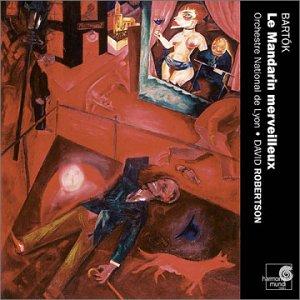
The Miraculous Mandarin Composer: Bela Bartok Performer(s): Robertson, Orchestre National De Lyon Harmonia Mundi Franc - #901777 This is billed as the world premiere recording of the original score restored in 1999 by Péter Bartók, the son of the composer which contains 30 bars previously missing and also restores dynamics, bowings and other performing directions from the autograph. Only those who follow along with the score will know the difference. Extraordinarily precise and sympathetic reading demonstrating why the young American David Robertson is considered one of the best interpretors at modern music by critics and audiences around the world. |

Tatjana Composer: Franz Lehar Performer(s): Jurowski Cpo Records - #999762 6 Re-working of Kukuschka (1898) - (1905) (Music by Franz Lehár: Libretto by Felix Falzari and Max Kalbeck) Though we still think of Franz Lehar as the leading operetta composer of the 20th century, his reputation now largely resides on one work, The Merry Widow (Die Lustige Witwe). The situation was much different during his lifetime, and many of his thirty-nine scores were loved, none more so than the story of Tatjana, daughter of a Volga fisherman. The score includes the exhilarating Russian Peasant Dances and the fine tenor aria 'Gedenke mein'. |
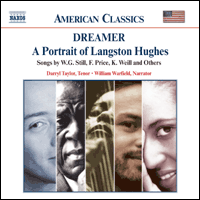
Dreamer A Portrait of Langston Hughes Performer(s): Various Artists Label: Naxos - #8559136 Nobody wrote more musical poetry than Langston Hughes, Ellie Steigmeister once declared and perhaps it is so. From "Lonely House," written with Kurt Weill to the recent "My People"with music by Ricky Ian Gordon, Hughes poems were naturals for settings by some of the 20th century finest songwriters. |
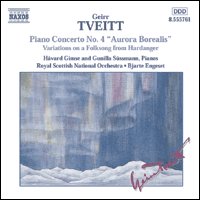
Piano Concerto #4 Composer: Geir Tveitt Naxos - #8555761 Thanks to Naxos' extraordinary Tveit series, I am now certain that the Norwegian Geir Tevitt was one of the great overlooked composers of the 20th century. With easily engaging music, often influenced by the folk music of his native Hardanger region of Norway, the extensive Variations for two pianos is a masterpiece. The duo pianists are used as virtuoso performers and in the role of decorating the orchestral score. If you haven't tried Tveitt, you've missed an eye-opening experience,
|
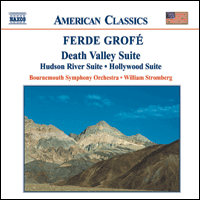
Death Valley Suite Composer: Ferde Grofe Naxos - #8559102 Ferde Grofe is known mostly for his Grand Canyon Suite but he wrote other splendid, atmospheric pieces as well, including these three suites, one of them ("Hollywood Suite") a premiere recording. Excellent performances of an American composer who may have been too quickly sent to the basket marked "kitsch." |
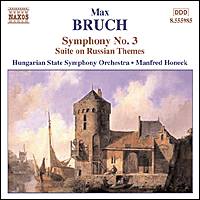
Symphony No. 3 Composer: Max Bruch Naxos - #8555985 Little known works by a composer best-known for his lush violin pieces. Sumptious tones and a fine romantic arc make this one easy to listen to and to like. |
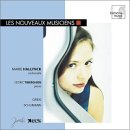
Cello Sonata / Cello Works Composers: Schumann, Grieg Performers: Marie Hallynck, Tiberghien Harmonia Mundi Franc - #911779 Harmonia mundi's Les Nouveaux Musiciens features the young Belgian/French cellist Marie Hallynck in stunning accounts of Schumann' s "Adagio and Allegro," "Phantasienstke," and "Funf Stucke im Volkston" for cello and piano, as well as Grieg's "Sonate Pour Violoncelle et Piano." Our kind of easy listening. |
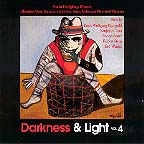
Darkness & Light 4 ComposerPerformer(s): Weiner, Starer, Stern, Korngold, Lees, Holt Albany Music Dist. - #518 The latest release from the Chamber Music Series at the United States Holocaust Memorial Museum is highlighted by the stunningly original "Piano Trio No. 2 "Silent Voices" (1998) by Benjamin Lees. Anguished and almost unbearably intense, Lees crams more drama, passion and empathy into this 14-minute piece than many composers muster in a lifetime. |
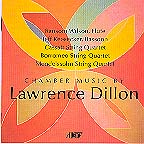
Chamber Music Composer: Lawrence Dillon Cassatt String Quartet, Borromeo String Quartet, Mendelssohn String Quartet In 1985, Lawrence Dillon became the youngest composer to earn a doctorate at the Juilliard School. He studied privately with Vincent Persichetti, and in classes with Milton Babbitt, Elliott Carter, David Diamond and Roger Sessions. Upon graduation, he was appointed to the Juilliard faculty. He is currently Assistant Dean at the North Carolina School of the Arts where he is also Composer-in-Residence and conductor of the contemporary music ensemble. The three pieces recorded here might be considered genre-bending in that they attempt to blend elements of post-modernism and older forms like romanticism. |
 |
Publisher: Duane Harper Grant (212) 582-4153 Editors: Jerry & Suzanne Bowles (212) 582-3791 Contributing Editor: Deborah Kravetz (C) Sequenza/21 LLC 2000 |
 |
Search WWW Search www.sequenza21.com |